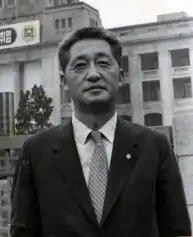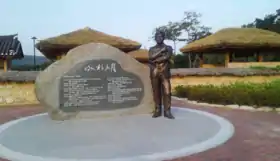Pak Mok-wol
Pak Mok-wol (Korean: 박목월, 6 January 1916 – 24 March 1978) was an influential Korean poet and academic.
Pak Mok-wol | |
|---|---|
 | |
| Born | January 6, 1916 Gyeongju, Korea |
| Died | March 24, 1978 (aged 62) Yongsan District, Seoul, South Korea |
| Occupation | Poet |
| Language | Korean |
| Korean name | |
| Hangul | |
| Hanja | |
| Revised Romanization | Bak Mok-wol |
| McCune–Reischauer | Pak Mogwŏl |
| Birth name | |
| Hangul | |
| Hanja | |
| Revised Romanization | Bak Yeongjong |
| McCune–Reischauer | Pak Yŏngjong |
Personal life
He was born Pak Yeongjong on January 6, 1916, in Moryang Village, Seo-myeon, Gyeongju, North Gyeongsang Province, in present-day South Korea, to parents Pak Jun-pil (박준필; 朴準弼) and Pak In-jae (박인재; 朴仁哉). He had a younger brother and two younger sisters.[1] He graduated from Keisung Middle School (today Keisung High School) in Daegu in 1935.[2] He lived in Tokyo from April 1937 until late 1939, during which period he devoted his time to writing.[3] From September 1939 to September 1940, he had several of his poems published in the magazine Munjang. Afterwards, due to increasing wartime censorship by the Japanese colonial government, he continued writing privately but did not publish any further poetry until after the liberation of Korea.[4] He was married to Yu Ik-sun (유익순; 劉益順), with whom he had four sons and a daughter.[5]
Pak taught at various schools including Keisung Middle School and Ewha Girls' High School beginning in 1946, before joining the faculty of Hongik University as an assistant professor in 1953.[2][6] In 1961 he took up a position as associate professor at Hanyang University (at which a statue was erected in his honor), and in 1963 he became a full professor there.[6][7] He was later named the dean of the university's College of Humanities.[3] In 1966 he was elected to the National Academy of Arts of the Republic of Korea (Yesurwon).[8] He was a board member of the Society of Korean Poets from its founding in 1957, and was chosen as the society's chairman in 1968.[9][10] He died on March 24, 1978, at his home in Wonhyoro-dong, Yongsan District, Seoul.[5]
Work
Pak Mok-wol began his career as a member of Cheongrok-pa (the Blue Deer school), a group of three poets who also included Cho Chi-hun and Pak Tu-jin, all named after the 1946 anthology in which they appeared. Although they differed in style, their work largely had its basis in natural description and human aspiration. The body of Pak Mok-wol's work at this time established a new trend in Korean poetry, one that attempted to express childlike innocence and wonder at life through folk songs and dialectal poetic language.
Among such poems, "The Wayfarer" (나그네) is notable and was set by the musician Isang Yun as the last in his early song book Dalmuri (A Halo, 1950).[11]
강나루 건너서 |
Across the ferry |
After his experiences during the Korean War, Pak's work shifted in style. Now he strove to incorporate the pain, death, and even monotony of daily existence into his poetry without maintaining a standard of sentimental and lyrical quality. His poetry collections, Wild Peach Blossoms (Sandohwa) and Orchids and Other Poems (Nan. Gita) encapsulate his artistic aim to depict the shifting human response to both the joys and sorrows of life. His later poems, however, represent a return to the use of vivid colloquial language as the medium through which to express the color and vitality of local culture.
His collection of poems from this later stylistic phase, Fallen Leaves in Gyeongsang-do (Gyeongsang-doui garangnip) provides the artistic forum through which he is able to further explore his earlier questions of the relationship between light and dark, happiness and despair, and life and death. Pak's poetry, especially his later work, reveals a fervent love for life that does not wane despite his diligent acknowledgment of the ever-present threat of the end. He is celebrated for the cautious optimism of his work and his ability to subtly internalize conflicts of empiric reality in his deceptively localized and dialectal poetry.[13]
Awards and legacy

Pak's awards include the Freedom Literature Awards, May Literature and Art Awards, the Seoul City Culture Awards (1969), and the Moran Medal of the Order of Civil Merit (1972).[14][15] In 2007, he was listed by the Korean Poets' Association among the ten most important modern Korean poets.[16]
Pak lived in a 37 pyeong (120 m2) house in Wonhyoro-dong from 1965 until his death in 1978. The Seoul Municipal Government had expressed interest in preserving the house as a cultural heritage asset, but his son had to sell it to a real estate developer to cover debts in 2002, and the developer demolished the building in 2004.[17] The demolition, along with similar incidents or near-misses involving the old houses of other cultural figures such as Choe Nam-seon and Seo Jeong-ju around the same time, sparked increasing public interest in the issue of cultural heritage preservation.[18][19]
Bibliography
Adapted from:[20]
- Cheongrokjip 《靑鹿集》 (Seoul: Uryu Munhwasa [乙酉文化社], 1946. OCLC 612986308.) With Cho Chi-hun and Pak Tu-jin.
- Sandohwa 《山桃花》 (Daegu: Yong-ung Chulpansa [英雄出版社], 1955. OCLC 38315740.)
- Boratbit Somyo 《보랏빛 素描》 (Seoul: Sinheung Chulpansa [新興出版社], 1958. .)
- Nan. Gita 《蘭·其他》 (Seoul: Singu Chulpansa [新丘文化社], 1959. OCLC 975807277.)
- Sansaeal Mulsaeal 《산새알 물새알》 (Seoul: Munwonsa [文苑社], 1961. .)
- Guwonui Yeon-ga 《久遠의 戀歌》 (Seoul: Gumunsa [歐文社], 1962. OCLC 975668342.) With Kim Nam-jo.
- Cheongdam 《晴曇》 (Seoul: Iljogak [一潮閣], 1964. OCLC 975804746.)
- Eomeoni 《어머니》 (Seoul: Samjungdang [三中堂], 1967. OCLC 37220182.)
- Gyeongsang-doui Garang-nip 《慶尙道의 가랑잎》 (Seoul: Minjung Seogwan [民衆書館], 1968. OCLC 56718987.)
- Cheongrokjip Gita 《靑鹿集 其他》 (Seoul: Hyeonamsa [玄岩社], 1968. OCLC 38315860.) With Cho Chi-hun and Pak Tu-jin.
- Cheongrokjip Ihu 《青鹿集 以後》 (Seoul: Hyeonamsa [玄岩社], 1968. OCLC 758338683.) With Cho Chi-hun and Pak Tu-jin.
- Musun 《無順》 (Seoul: Samjungdang [三中堂], 1976. OCLC 975668842.)
Works in translation
- Selected Poems of Pak Mogwol, English (박목월 시선집. Uchang Kim, translator. Berkeley: Asian Humanities Press, 1990. OCLC 1036858493.)
- Le Passant, French (나그네. Kim Hyeon-ju and Pierre Mesini, translators. Marseille: Autres Temps, 2000. OCLC 248004898.)
- 《过客》, Chinese (나그네. Heo Se-uk [許世旭], translator. Tianjin: Baihua Wenyi Chubanshe [百花文艺出版社], 2003. OCLC 866238058.)
References
- "경주 서면 출생 박목월" [Park Mok-wol, who was born in Seo-myeon, Gyeongju]. Kyongbuk Maeil. 2008-01-10. Retrieved 2018-09-25.
- "박목월(朴木月)" [Park Mok-wol]. Seoul: National Library of Korea. Retrieved 2018-09-24.
- "大學 문턱 안 넘고도… (3) 朴木月 (시인·漢陽大文理大학장)" [Even if you do not step over the threshold of the university (3): Park Mok-wol (poet, dean of Hanyang University College of Humanities)]. Kyunghyang Shinmun. 1976-02-03. p. 5. Retrieved 2018-09-25 – via Naver News Library.
- Chung, Kwa-ri (1993). "The Song of Nature: Park Mok-wol". Koreana. 7 (2). Retrieved 2018-09-25.
- "詩人 朴木月씨 別世" [Poet Park Mok-wol passes away]. The Dong-a Ilbo. 1978-03-24. p. 5. Retrieved September 24, 2018 – via Naver News Library.
- "박목월(朴木月)" [Park Mok-wol]. Encyclopedia of Korean Culture. Academy of Korean Studies. Retrieved 2018-09-25.
- Kim, Mo-Ryun (May 2003). "Mokwol's monument inscribed with a poem". Weekly Hanyang. Archived from the original on 2014-07-14.
- "學·藝術院 會員개선 새로21名 選任" [Elections for membership in National Academies of Arts, Sciences: 21 newly elected]. The Dong-a Ilbo. 1966-03-16. p. 3. Retrieved 2018-09-25 – via Naver News Library.
- "詩人協會總會서 幹事等任員選出" [Leadership elected at general meeting of Society of Poets]. The Dong-a Ilbo. 1957-02-07. p. 4. Retrieved 2018-09-25 – via Naver News Library.
- "詩協會長朴木月씨" [Society of Poets chairman Park Mok-wol]. The Dong-a Ilbo. 1968-09-10. p. 5. Retrieved 2018-09-25 – via Naver News Library.
- Hyunjung Kim, National Consciousness in Korean Art Songs, Arizona State University 2009, pp.33-43
- The Columbia Anthology of Modern Korean Poetry, New York 2004, p.114
- "박목월 biographical datasheet". Archived from the original on September 21, 2013. Retrieved September 3, 2013.
- "서울市文化賞 수상자 결정" [Decision on recipients of Seoul City Culture Awards]. Kyunghyang Shinmun. 1969-04-15. p. 4. Retrieved 2018-09-24 – via Naver News Library.
- "藝術人에 勳章 李海浪씨등 9명" [Awards to nine artists including Yi Hae-rang]. Kyunghyang Shinmun. 1972-11-08. p. 1. Retrieved 2018-09-24 – via Naver News Library.
- Chung, Ah-young (October 15, 2007). "Top Ten Korean Modern Poets Selected". The Korea Times. Retrieved February 12, 2020.
- "박목월 옛집 자식 빚 때문에 철거" [Demolition of Pak Mok-wol's house due to debts]. The Hankyoreh. 2004-02-23. Retrieved 2018-09-25.
- "문화예술인 옛집 복원" [Restoration of the old houses of culture and arts figures]. Hankook Ilbo. 2012-11-22. Retrieved 2018-09-25.
- "박목월 생가" [Park Mok-wol's birthplace]. Kyongbuk Ilbo. 2014-06-19. Retrieved 2018-09-25.
- Ji Hyeon-bae [지현배] (2010). 《대구 경북의 시인의 코드》 [The Code of Poets in Daegu and North Gyeongsang]. 한국학술정보/이담북스. pp. 178–179. ISBN 9788926806944.